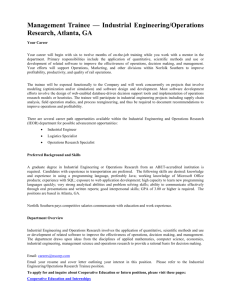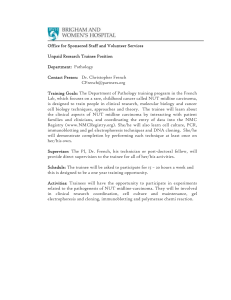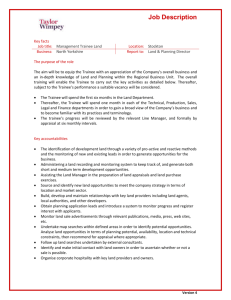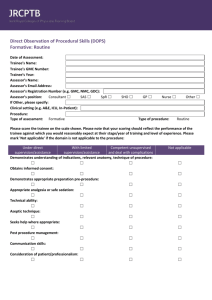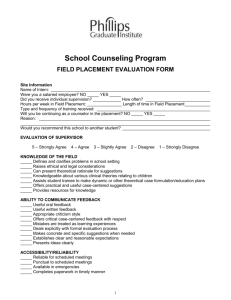Trainees with difficulties - The Essential Handbook for GP Training
advertisement
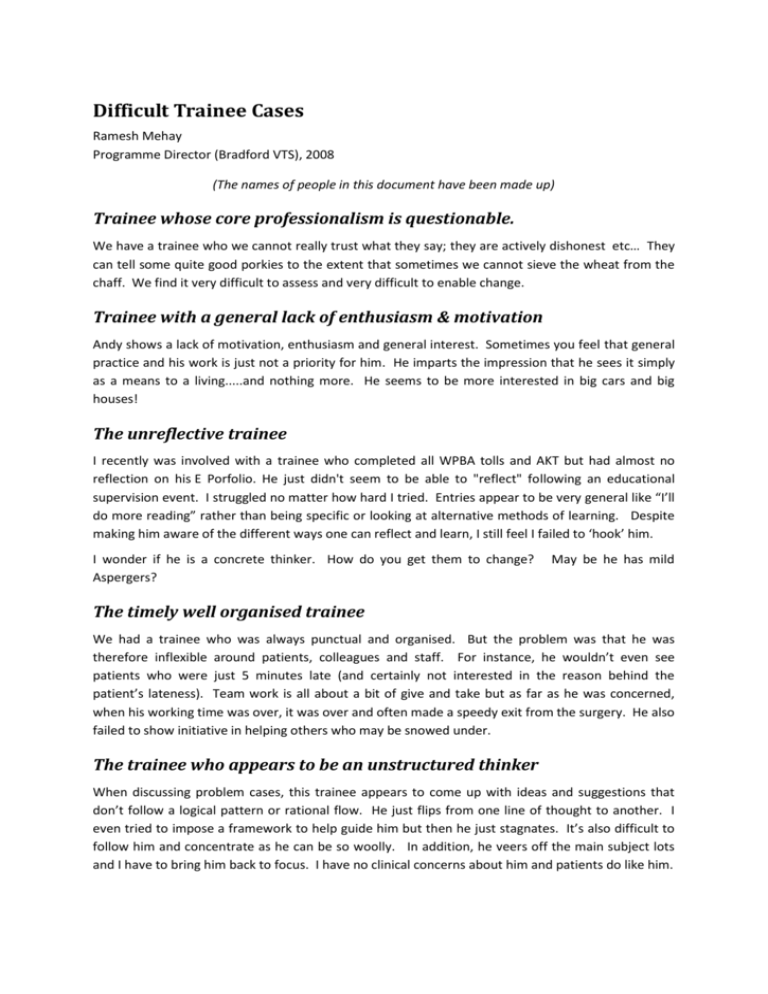
Difficult Trainee Cases Ramesh Mehay Programme Director (Bradford VTS), 2008 (The names of people in this document have been made up) Trainee whose core professionalism is questionable. We have a trainee who we cannot really trust what they say; they are actively dishonest etc… They can tell some quite good porkies to the extent that sometimes we cannot sieve the wheat from the chaff. We find it very difficult to assess and very difficult to enable change. Trainee with a general lack of enthusiasm & motivation Andy shows a lack of motivation, enthusiasm and general interest. Sometimes you feel that general practice and his work is just not a priority for him. He imparts the impression that he sees it simply as a means to a living.....and nothing more. He seems to be more interested in big cars and big houses! The unreflective trainee I recently was involved with a trainee who completed all WPBA tolls and AKT but had almost no reflection on his E Porfolio. He just didn't seem to be able to "reflect" following an educational supervision event. I struggled no matter how hard I tried. Entries appear to be very general like “I’ll do more reading” rather than being specific or looking at alternative methods of learning. Despite making him aware of the different ways one can reflect and learn, I still feel I failed to ‘hook’ him. I wonder if he is a concrete thinker. How do you get them to change? Aspergers? May be he has mild The timely well organised trainee We had a trainee who was always punctual and organised. But the problem was that he was therefore inflexible around patients, colleagues and staff. For instance, he wouldn’t even see patients who were just 5 minutes late (and certainly not interested in the reason behind the patient’s lateness). Team work is all about a bit of give and take but as far as he was concerned, when his working time was over, it was over and often made a speedy exit from the surgery. He also failed to show initiative in helping others who may be snowed under. The trainee who appears to be an unstructured thinker When discussing problem cases, this trainee appears to come up with ideas and suggestions that don’t follow a logical pattern or rational flow. He just flips from one line of thought to another. I even tried to impose a framework to help guide him but then he just stagnates. It’s also difficult to follow him and concentrate as he can be so woolly. In addition, he veers off the main subject lots and I have to bring him back to focus. I have no clinical concerns about him and patients do like him. Work-life balance issues The trainee who is finding it difficult to balance work and life: it strikes me that there are several components to her distress: work, leaving her child, working relationships and help from colleagues, systems for BHT, the type of child care she has chosen, the support she has locally. Looking at the whole it strikes me her situation is likely to be completely unworkable. The trainee who cries Mumtaz is still extremely fragile and has really poor self esteem and confidence. She does, however, put on a brave face. I believe she has started some counselling re: the other stuff. The longer it goes on, the more I believe this to be part of her personality set, and not anything WE can change. I have been gently challenging her on her need for constant reassurance when she knows that what she is doing is good. Last tutorial, I told her she was a black hole for reassurance & praise & I wasn't going to be able to fill it... I also wonder whether these emotional feelings are part of her persona and actually work towards helping her: ie encouraging her to reflect and problem solve in a timely fashion by herself? As Gestaltists might say, are we unnecessarily problem solving for her; won’t it will happen naturally anyway after a period of emotional venting and reflection? Are we therefore interrupting a process that will serve her anyway? I'm also wondering if at bottom, what she wants is to be a full time mum. The trainee who finds it difficult to apply clinical knowledge/make quick clinical decisions A trainee, whilst appearing confident in terms of knowledge gained, repeatedly demonstrates a lack of confidence in applying knowledge, takes a considerable time to make simple clinical decisions and runs very late. Part of the problem seems that he tries to base all decision making on evidence from text books and protocols, and much time is spent in trying to find this evidence. Various strategies were offered to tackle this issue. These included: encouraging the trainee for all or part of a surgery to only use the information they have already known to make safe clinical decisions that may not be 100% evidence based; ‘modelling’ clinical-decision-making by involving the trainer in a sit and swap surgery with each seeing alternate patients with the trainee and appreciating the learner-centred view of a trainee who is new to general practice recently out of hospital jobs. The trainee who just wont reveal his blind spots. We discussed 2 recent consultations where we had been very unhappy with this particular trainee’s care on a purely clinical basis. On reflection, we find it to explore areas of uncertainty/doubt/underperformance. He is very adept at moving the discussion away or simply not responding to our probing. I had already tried discussing one of the cases with him and he simply wasn't responding to my concern. He seems to be going through a bad patch at present: he is very keyed up to taking the MCQ summative assessment and is clearly practicing between patients. Each surgery there are huge gaps between his patients and he is taking very little time per patient (and it looks to have got less recently). When I looked at the one patient he appeared to have taken 5 minutes over the consultation then waited 18 minutes for the next patient to arrive. I feel very disappointed that he is now 3 months in and this is how he is functioning. I am going to try and discuss this sort of issue during our tutorial today but as I'd mentioned to Ramesh he had said he was really too busy studying for a tutorial. I don't know what you want me to do? I really don't think he is going to change; he is very fixed in his ways of working. I mentioned to Ramesh that I thought a lot of Practices would like him as he rattles through patients and always smiles! Should I just leave him be? The trainee with strong religious values Just had a very interesting conversation about this with Simon, my current trainee who is an active Christian (and an absolutely ace trainee). He told me about a Muslim girl with quite bad asthma whom he was seeing in BRI - I forget the reason he asked her if she was in the habit of praying, but it may have been because she was saying she felt so ill - anyway she said she wasn't, but would be likely to ask her mum to pray for her. Very tentatively, Simon asked if she would like him to do so, she said she would, he did and she said she felt much calmer. He then encountered her twice more with acute asthma admissions, and she asked him to pray for her again and it helped - she then asked him why more doctors don't do this! Is this a problem? Are we creating one when there is just no need to do so? Sally would offer praying for her patients sometimes in preference to conventional treatments. We were unsure how to tackle this as we did not want to offend her core values and maintain the trainer-trainee relationship. Even if she did offer this as an additional option to all the other management pathways, is this fair on patients who don’t believe or have an alternative faith? Isn’t spirituality part of the concept of health and wholeness? The trainee who simply keeps putting off videoing her consultations We have a trainee who keeps making excuses why she has not had time to bring a video consultation to a teaching session. When asked for specifics, she comes up with vague reasons. We think she doesn’t want to do video consultations or simply just isn’t ready. But time is running out for the assessments. Delving into the whole process of video case analysis can be daunting, especially to the trainee who has never been engaged in this process before. Reasons for this are many but the predominant ones that come to mind are a) a feeling of being examined/assessed b) worries about looking incompetent c) worries regarding a lack of knowledge d) worries about looking ugly/unattractive (very much like the way most people don't like the sound of their voice when an audio tape of themselves is played). Any ideas on how to tackle this. Someone suggested starting off by showing ourselves on video and running a tutorial session looking at our consulting style. Some else advised turning the sound off so as to appear less overwhelming. Another suggested doing joint surgeries together so she gets used to me looking at her. Any other thoughts?

